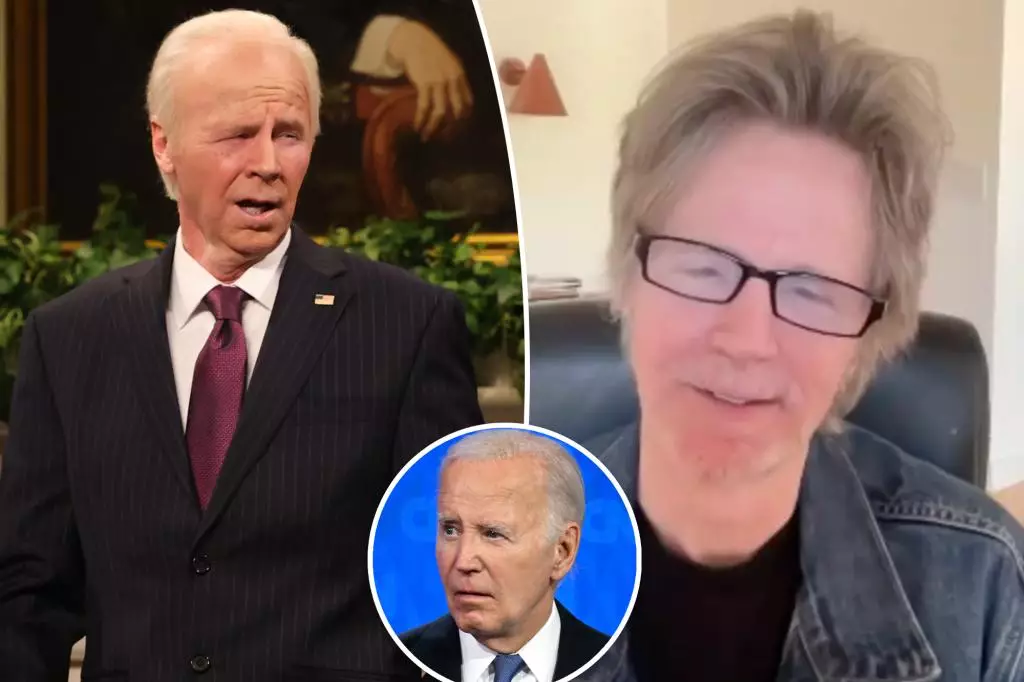Dana Carvey, a stalwart of American comedy and an indelible part of the “Saturday Night Live” (SNL) legacy, recently made headlines with his brief return to the iconic show. With politics intersecting sharply with entertainment, Carvey found himself compelled back into the comedic fray, tasked with impersonating former President Joe Biden. Given the tumultuous political climate, it’s worthwhile to explore Carvey’s motivations, his methods, and the profound implications of political satire in modern media. This comeback was not merely a nostalgic rekindling; it was a bold affirmation of the serious role humor plays in engaging with the sociopolitical landscape.
The Persuasive Powers of Lorne Michaels
In an exclusive interview, Carvey revealed how influential SNL’s producer Lorne Michaels was in coaxing him back to New York City. Michaels’ charm and charisma transformed what could have been a mundane six-week engagement into an exhilarating prospect for Carvey. The phrase, “It’ll be Autumn in New York… and then afterwards you can tell us to f—k off,” encapsulates the humorous yet earnest nature of their discourse. It highlights not only the camaraderie within the SNL family but also the playful willingness to embrace uncertainty in an unpredictable political environment.
However, the uncertainty was not purely humorous. Carvey, who is known for his acute observational skills, felt the weight of the current political atmosphere. During Biden’s challenging debate against Trump, the comedian sensed that his return to SNL, albeit amusing, might soon be cut short. “I turned to my wife and said, ‘We’re not going to New York,’” he recounted, underscoring how closely connected comedians must be to the zeitgeist to remain relevant and resonant.
The Craft of Impersonation
Carvey’s impersonation of Biden was not an exercise in mockery but rather an intricate dance of nuance and humor. He articulated his approach as one of delicate precision, akin to “threading a needle.” This metaphor vividly illustrates the careful balance that comedic impersonators navigate; their goal is not to diminish or deride the subject but to uncover underlying hilarity within their quirks and idiosyncrasies. Carvey’s commitment to kindness is equally essential, as he insists, “I’m not trying to really make political points or put them down.” This mindset fosters a more accessible form of comedy that resonates widely, appealing to audiences across the political spectrum.
What shines through in Carvey’s characterization are not only his mimicked gestures, such as the signature scratching of Biden’s face, but also his commitment to portraying the essence of the individual. By focusing on relatable, human elements—like the amusing act of picking up “toys on the carpet”—Carvey crafts a multidimensional portrayal that extends beyond the superficial confines of mere impersonation.
A Debt of Gratitude to Past Presidents
Interestingly, Carvey’s engagement with presidential impersonation is not a recent phenomenon. His portrayal of George H.W. Bush between 1986 and 1993 showcased his talent, earning admiration from the very man he lampooned. The anecdote of being invited to the White House by Bush after a contentious election serves as a testament to the power of comedy to bridge divides and nurture personal connections, despite adversities.
Bush’s genuine appreciation for Carvey’s work exemplifies the idea that humor can serve as a unifying force, capable of softening political tensions. This dynamic relationship between comedian and subject offers valuable insights into how individuals in the public eye can embrace humor, potentially transforming contentious politics into relatable narratives.
A Continued Legacy in Comedy
While Carvey’s return to SNL was momentary, his influence on the landscape of political satire remains profound. Co-hosting a podcast with fellow alum David Spade, Carvey continues to engage with audiences outside traditional television formats, sharing behind-the-scenes stories and dissecting the intersection of entertainment and political discourse. This evolution in how comedy is consumed underscores the importance of adapting to changing mediums while preserving the mission of laughter and connection.
In the ever-evolving world of entertainment, Dana Carvey’s adaptations reflect a broader trend in comedy: the pursuit of relatability and genuine engagement in an increasingly polarized society. His artistry not only highlights the power of satire but also reaffirms that, at its best, comedy invites everyone to the table, regardless of their political inclinations. Through humor, Carvey encapsulates the hope that society can find common ground amid division, turning serious moments into shared laughter.

